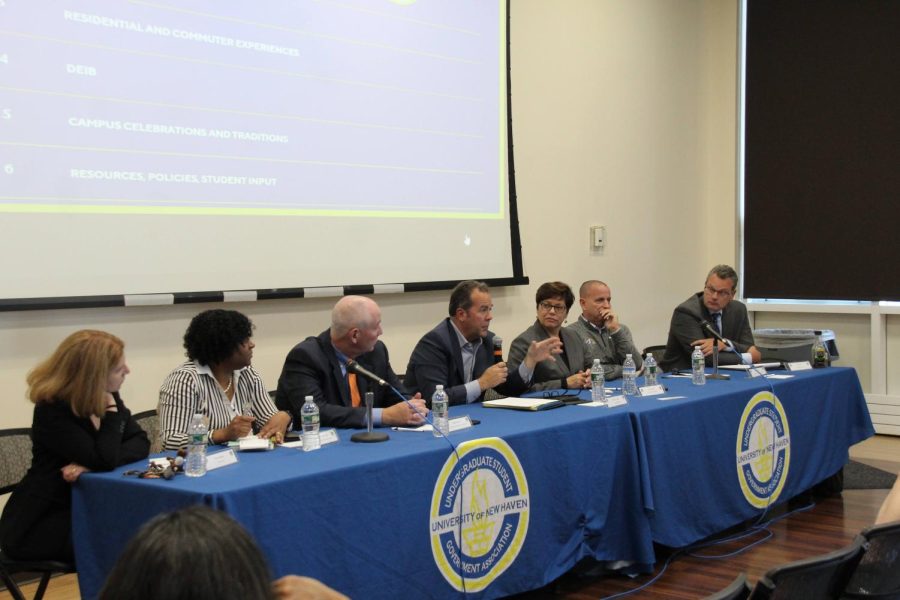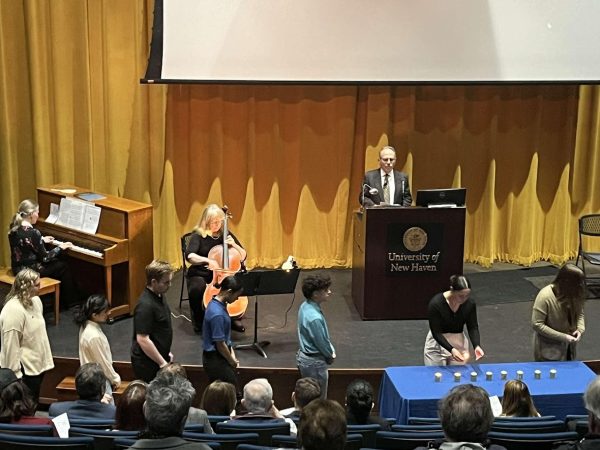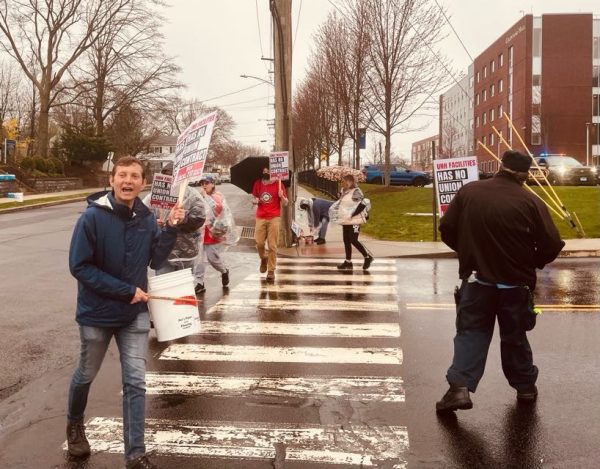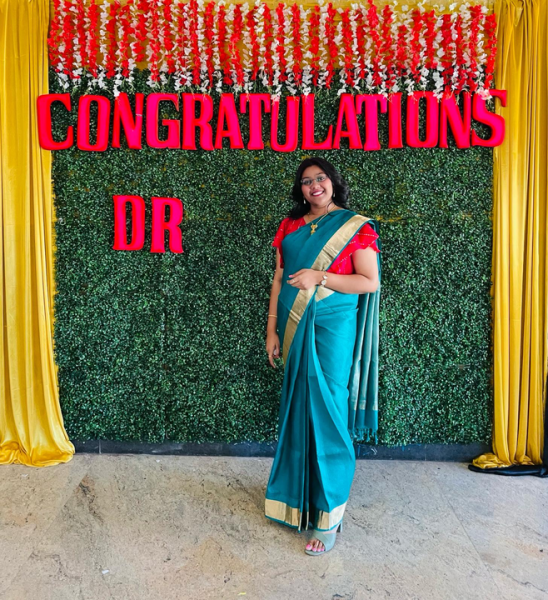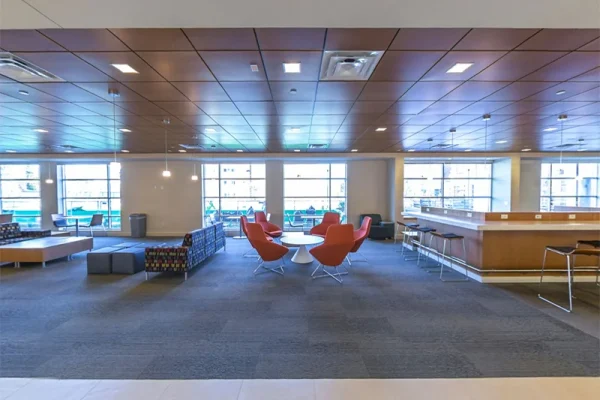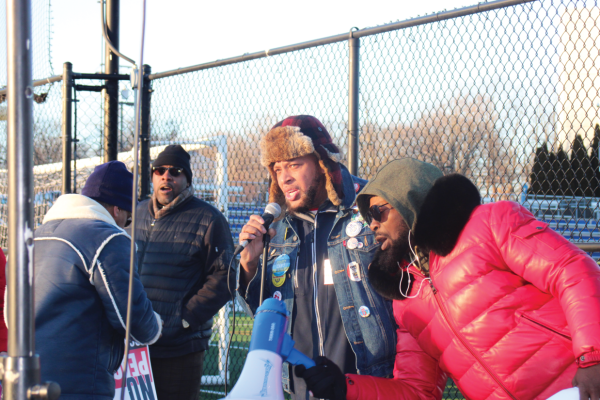Students voice concerns at USGA’s ‘Be Heard Forum’
Photo courtesy of Charger Bulletin/Samuel Weinmann.
Panel of university administrators watch as President Zenger addresses students, West Haven, Sept. 28, 2022.
Editor’s Note 10/4/22: It has been brought to our attention that a comment that was previously attributed to Gregory Eichhorn, vice president for enrollment and student success was actually given by University President Sheahon Zenger. This has since been corrected.
Food safety, staff retention and campus accessibility are only a few of many issues voiced by students at the Undergraduate Student Government Association’s (USGA) second “Be Heard Forum” of the semester. This forum, held on Wednesday night, allowed student panelists to voice their questions and concerns to a panel of university administrators.
While USGA prepared a suggested schedule of events, covering topics such as academics, extracurriculars, commuter experiences and diversity on campus, students weren’t afraid to voice their opinions on other topics as well.
As one of the first students to voice their concerns about ongoing issues, Leo Levine-Aquino, a senior forensic science major, spoke about the university’s misrepresentation of ethnic food. Levine-Aquino said “A big thing that I have had a lot of problems with… [is] the misrepresentation with our food… and it doesn’t just happen with Jewish Food of Hispanic Food; I know I’ve seen Indian food being completely misrepresented as well.”
Levine-Aquino elaborated saying, “that’s one big thing I want to work on… because dining has been a problem since I’ve been a freshman. When I was a freshman, raw chicken was a huge problem, and they’ve gotten better at it… but still, sometimes students will find raw burgers or undercooked food that’s not safe to eat.”
Youssef Ossama, a junior marketing major, added on the issue of food at the university, saying that he has “been on the dining committee for about a year now [and] wants more halal food on campus.” Ossama said “As a person who cannot eat pork, it should be treated just like an allergy, or something that is fatal; but they don’t treat it like that, they use the same utensils for the pork and the chicken.”
After discussing the issue of food at the forum, students then moved on to talk about Greek Life, and the decline in involvement over the years. Christian Castro, president of Sigma Chi, discussed this issue, saying that he “was just interested if there was… some sort of plan as far as dealing with Greek Life on campus, [and] the decline we’re experiencing right now.”
University President Sheahon Zenger responded to this, saying “I just had a meeting… with the head of Greek Life, [and] according to what they told me, the numbers were almost half of what they were previously.” He then said that he was going to do whatever was necessary to help Greek Life improve their involvement numbers.
Another issue discussed was the lack of staff retention, specifically at student-centered offices like the Myatt Center and at the office of Counseling & Psychological Services (CAPS).
Levine-Aquino spoke to this issue and said “In terms of CAPS, getting appointments is a problem for some students… they are completely overbooked. My therapist from last semester left the university and I know they lost some others as well, but they basically don’t have the funding… to be able to hire more staff.”
Levine-Aquino then shared a personal story, saying “My first appointment [at CAPS was] Sept. 14, and the only available second appointment was Thursday, Oct. 6, so that’s three weeks, and I find that pretty unacceptable.”
Levine-Aquino also said that this same issue applied to the Myatt Center, referring to multiple staff members who have had to leave in recent years due to inadequate pay.
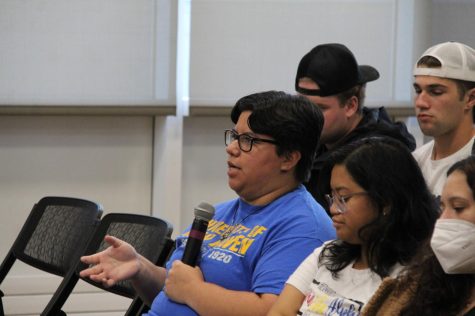
In response to this, Dean of Students Ophelie Rowe-Allen said “We… want to make sure that others feel a sense of belonging, and we are aware of what is happening… we acknowledge some of the hardship that [has] happened… and so for the staff that we have there, we will do our best to make sure that they’re also finding a sense of joy in [their] space also.”
Among one of the more widely discussed topics was accessibility on campus. Liv Knight, a senior computer science major, voiced their concerns, saying that they “feel…that the way this university is run is ableist,” mentioning the lack of mobility on many parts of the campus.
“There have been several situations where people who have been using wheelchairs or other mobility devices have been unable to access certain parts of campus or certain events… because its location isn’t accessible.” Knight also mentioned that Bucknall theater, the typical location for USGA meetings, isn’t a very accessible location, given the theater’s lack of options for those using mobility devices.
Rowe-Allen, from the panel, responded to this issue, saying “there is a new [event accessibility] policy that has been developed by the university… whenever you’re planning an event, you have to think of universal design. Think about when you walk in a room… [you have to think] ‘can I accommodate everyone in this room?'” She then encouraged anyone holding events at the university to reference the university’s new accessibility policy.
To add onto the concerns about accessibility, Alandre Alexis, assistant director for recognized student organizations and operations, said “accessibility is something that we have talked about at CSELO at our staff meetings very recently. This is something we have reviewed a lot so… when it comes to any off campus event or any event that has to do with transportation… go to Charger Connection to indicate any accommodation required.” Alexis elaborated, by stressing the importance of indicating any disability accommodations beforehand to ensure that all off campus events are as accessible as possible.
To conclude the panel, Mary Lippa, vice president of community, advocacy and diversity, mentioned USGA was doing all it can to increase accessibility during its meetings, but defended Bucknall theater as their meeting location, saying that “Bucknall allows us to be distanced from each other, and as much as we don’t want to admit it, COVID is still a thing.”
Lippa elaborated, saying “I know that we have a lot of individuals who would die if they got severe COVID, and that thought haunts me.”
After the panel concluded, and participants began to shuffle out of the room, Zenger spoke further on how he and other members of university administration would be addressing these accessibility concerns. He said “As we all took notes, and as we have a number of individuals connected to [particular] areas on campus… hopefully we can make progress.”
Zenger then said “As we have meetings throughout the coming weeks and months, we’ll be addressing those [areas of concern].”
Particular members of the USGA eboard also agreed to comment about the panel. USGA President Saniyah Brinney responded to a question about how the USGA would help keep administration accountable on these concerns by saying “As President Zenger stated, we do have weekly to biweekly meetings, and I also meet with [Ophelie] Rowe-Allen on an every day schedule…. So as president I also make sure to keep reminding them back to back.” Brinney then said that she is “very confident in President Zenger,” and that he is “very passionate when it comes to his work with students.”
When asked to provide comments about how the USGA will ensure that students who aren’t able to attend to forum in person can still voice their concerns, Sankofa Benzo, sergeant at arms of USGA, said “I… think that for students who cannot be here… that being proactive in reaching out to the USGA eboard, and especially the president [is the way for them to] actually put their ideas forth, and then the USGA president can take those to the proper administrators.”
Brinney said that although these panels are currently set to take place each semester, that with increased student involvement and interest, they could take place more frequently.
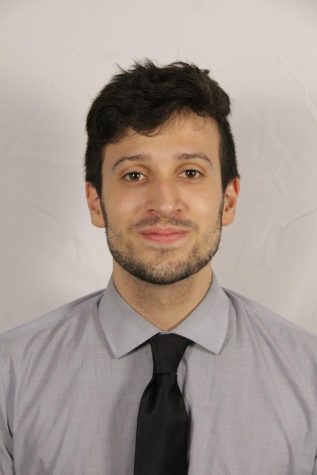
Samuel Weinmann is a passionate journalist who is a junior international affairs major at the University of New Haven. As the editorial head of the Charger...

